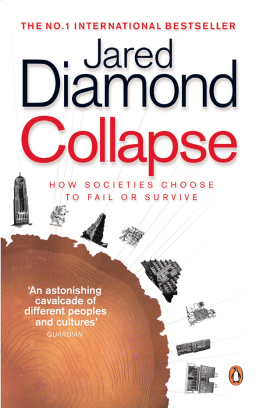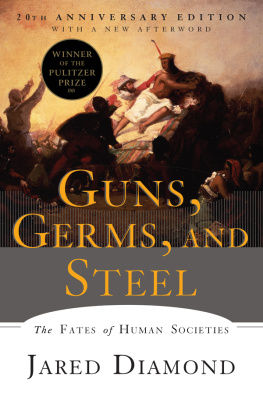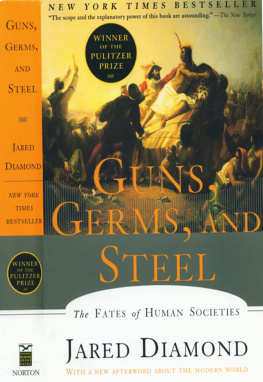Diamond - Guns, germs, and steel : the fates of human societies
Here you can read online Diamond - Guns, germs, and steel : the fates of human societies full text of the book (entire story) in english for free. Download pdf and epub, get meaning, cover and reviews about this ebook. City: New York, year: 1997,1999, publisher: W.W. Norton, genre: History. Description of the work, (preface) as well as reviews are available. Best literature library LitArk.com created for fans of good reading and offers a wide selection of genres:
Romance novel
Science fiction
Adventure
Detective
Science
History
Home and family
Prose
Art
Politics
Computer
Non-fiction
Religion
Business
Children
Humor
Choose a favorite category and find really read worthwhile books. Enjoy immersion in the world of imagination, feel the emotions of the characters or learn something new for yourself, make an fascinating discovery.
Guns, germs, and steel : the fates of human societies: summary, description and annotation
We offer to read an annotation, description, summary or preface (depends on what the author of the book "Guns, germs, and steel : the fates of human societies" wrote himself). If you haven't found the necessary information about the book — write in the comments, we will try to find it.
Abstract: Fascinating... Lays a foundation for understanding human history.-Bill Gates Read more...
Diamond: author's other books
Who wrote Guns, germs, and steel : the fates of human societies? Find out the surname, the name of the author of the book and a list of all author's works by series.
Guns, germs, and steel : the fates of human societies — read online for free the complete book (whole text) full work
Below is the text of the book, divided by pages. System saving the place of the last page read, allows you to conveniently read the book "Guns, germs, and steel : the fates of human societies" online for free, without having to search again every time where you left off. Put a bookmark, and you can go to the page where you finished reading at any time.
Font size:
Interval:
Bookmark:
No scientist brings more experience from the laboratory and field, none thinks more deeply about social issues or addresses them with greater clarity, than Jared Diamond as illustrated by Guns, Germs, and Steel . In this remarkably readable book he shows how history and biology can enrich one another to produce a deeper understanding of the human condition.
Edward O. Wilson, Pellegrino University Professor, Harvard University
Serious, groundbreaking biological studies of human history only seem to come along once every generation or so. Now Jared Diamond must be added to their select number. Diamond meshes technological mastery with historical sweep, anecdotal delight with broad conceptual vision, and command of sources with creative leaps. No finer work of its kind has been published this year, or for many past.
Martin Sieff, Washington Times
[Diamonds] masterful synthesis is a refreshingly unconventional history informed by anthropology, behavioral ecology, linguistics, epidemiology, archeology, and technological development.
Publishers Weekly (starred review)
[Jared Diamond] is broadly erudite, writes in a style that pleasantly expresses scientific concepts in vernacular American English, and deals almost exclusively in questions that should interest everyone concerned about how humanity has developed. [He] has done us all a great favor by supplying a rock-solid alternative to the racist answer. A wonderfully interesting book.
Alfred W. Crosby, Los Angeles Times
Fascinating and extremely important. [A] synopsis doesnt do credit to the immense subtlety of this book.
David Brown, Washington Post Book World
Deserves the attention of anyone concerned with the history of mankind at its most fundamental level. It is an epochal work. Diamond has written a summary of human history that can be accounted, for the time being, as Darwinian in its authority.
Thomas M. Disch, New Leader
A wonderfully engrossing book. Jared Diamond takes us on an exhilarating world tour of history that makes us rethink all our ideas about ourselves and other peoples and our places in the overall scheme of things.
Christopher Ehret, Professor of African History, UCLA
Jared Diamond masterfully draws together recent discoveries in fields of inquiry as diverse as archaeology and epidemiology, as he illuminates how and why the human societies of different continents followed widely divergent pathways of development over the past 13,000 years.
Bruce D. Smith, Director, Archaeobiology Program,
Smithsonian Institution
The question, Why did human societies have such diverse fates? has usually received racist answers. Mastering information from many different fields, Jared Diamond convincingly demonstrates that head starts and local conditions can explain much of the course of human history. His impressive account will appeal to a vast readership.
Luca Cavalli-Sforza, Professor of Genetics, Stanford University
THE FATES OF HUMAN SOCIETIES

W. W. Norton & Company
New York London
To Esa, Kariniga, Omwai, Paran, Sauakari, Wiwor,
and all my other New Guinea friends and teachers
masters of a difficult environment
Copyright 1999, 1997 by Jared Diamond
All rights reserved
For information about permission to reproduce selections from this book, write to Permissions, W. W. Norton & Company, Inc., 500 Fifth Avenue, New York, NY 10110.
The text of this book is composed in Sabon with the display set in Trajan Bold Composition and manufacturing by the Maple-Vail Book Manufacturing Group Book design by Chris Welch
Library of Congress Cataloging-in-Publication Data
Diamond, Jared M.
Guns, germs, and steel: the fates of human societies / Jared Diamond.
p. cm.
Includes bibliographical references.
ISBN: 978-0-393-06922-8
1. Social evolution. 2. CivilizationHistory. 3. Ethnology. 4. Human beingsEffect of environment on. 5. Culture diffusion. I. Title.
HM206.D48 1997
303.4dc21
96-37068
CIP
W. W. Norton & Company, Inc., 500 Fifth Avenue, New York, N. Y. 10110
www.wwnorton.com
W. W. Norton & Company Ltd., Castle House, 75/76 Wells Street,
London W1T 3QT
PROLOGUE Y ALIS Q UESTION
The regionally differing courses of history
CHAPTER 1 UP TO THE STARTING LINE
What happened on all the continents before 11,000 B.C.?
CHAPTER 2 A NATURAL EXPERIMENT OF HISTORY
How geography molded societies on Polynesian islands
CHAPTER 3 COLLISION AT CAJAMARCA
Why the Inca emperor Atahuallpa did not capture King Charles I of Spain
CHAPTER 4 FARMER POWER
The roots of guns, germs, and steel
CHAPTER 5 HISTORYS HAVES AND HAVE-NOTS
Geographic differences in the onset of food production
CHAPTER 6 TO FARM OR NOT TO FARM
Causes of the spread of food production
CHAPTER 7 HOW TO MAKE AN ALMOND
The unconscious development of ancient crops
CHAPTER 8 APPLES OR INDIANS
Why did peoples of some regions fail to domesticate plants?
CHAPTER 9 ZEBRAS, UNHAPPY MARRIAGES, AND THE ANNA KARENINA PRINCIPLE
Why were most big wild mammal species never domesticated?
CHAPTER 10 SPACIOUS SKIES AND TILTED AXES
Why did food production spread at different rates on different continents?
CHAPTER 11 LETHAL GIFT OF LIVESTOCK
The evolution of germs
CHAPTER 12 BLUEPRINTS AND BORROWED LETTERS
The evolution of writing
CHAPTER 13 NECESSITYS MOTHER
The evolution of technology
CHAPTER 14 FROM EGALITARIANISM TO KLEPTOCRACY
The evolution of government and religion
CHAPTER 15 YALIS PEOPLE
The histories of Australia and New Guinea
CHAPTER 16 HOW CHINA BECAME CHINESE
The history of East Asia
CHAPTER 17 SPEEDBOAT TO POLYNESIA
The history of the Austronesian expansion
CHAPTER 18 HEMISPHERES COLLIDING
The histories of Eurasia and the Americas compared
CHAPTER 19 HOW AFRICA BECAME BLACK
The history of Africa
EPILOGUE T HE F UTURE OF H UMAN
H ISTORY AS A S CIENCE
W HY IS W ORLD H ISTORY L IKE AN O NION ?
T HIS BOOK ATTEMPTS TO PROVIDE A SHORT HISTORY OF everybody for the last 13,000 years. The question motivating the book is: Why did history unfold differently on different continents? In case this question immediately makes you shudder at the thought that you are about to read a racist treatise, you arent: as you will see, the answers to the question dont involve human racial differences at all. The books emphasis is on the search for ultimate explanations, and on pushing back the chain of historical causation as far as possible.
Most books that set out to recount world history concentrate on histories of literate Eurasian and North African societies. Native societies of other parts of the worldsub-Saharan Africa, the Americas, Island Southeast Asia, Australia, New Guinea, the Pacific Islandsreceive only brief treatment, mainly as concerns what happened to them very late in their history, after they were discovered and subjugated by western Europeans. Even within Eurasia, much more space gets devoted to the history of western Eurasia than of China, India, Japan, tropical Southeast Asia, and other eastern Eurasian societies. History before the emergence of writing around 3,000 B.C. also receives brief treatment, although it constitutes 99.9% of the five-million-year history of the human species.
Such narrowly focused accounts of world history suffer from three disadvantages. First, increasing numbers of people today are, quite understandably, interested in other societies besides those of western Eurasia. After all, those other societies encompass most of the worlds population and the vast majority of the worlds ethnic, cultural, and linguistic groups. Some of them already are, and others are becoming, among the worlds most powerful economies and political forces.
Font size:
Interval:
Bookmark:
Similar books «Guns, germs, and steel : the fates of human societies»
Look at similar books to Guns, germs, and steel : the fates of human societies. We have selected literature similar in name and meaning in the hope of providing readers with more options to find new, interesting, not yet read works.
Discussion, reviews of the book Guns, germs, and steel : the fates of human societies and just readers' own opinions. Leave your comments, write what you think about the work, its meaning or the main characters. Specify what exactly you liked and what you didn't like, and why you think so.

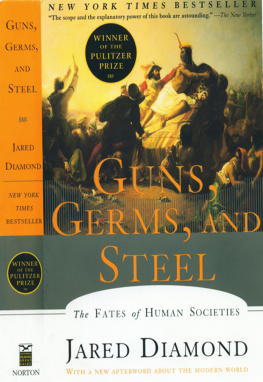

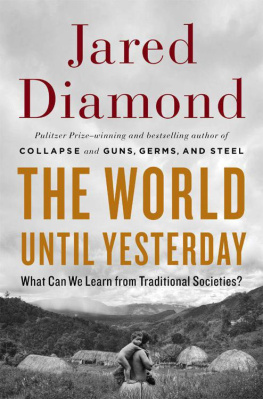
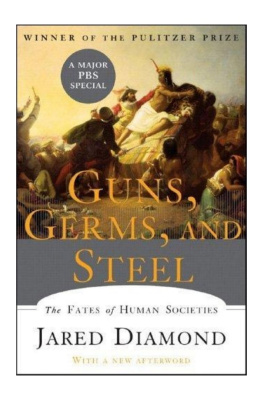
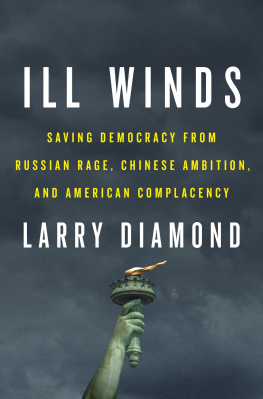
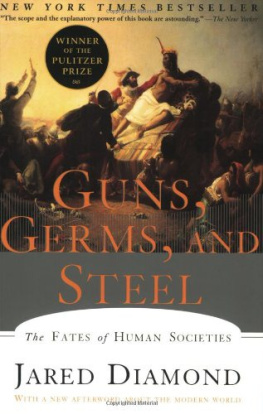
![Diamond - By Lisa M. Diamond: Sexual Fluidity: Understanding Womens Love and Desire [Paperback]](/uploads/posts/book/138039/thumbs/diamond-by-lisa-m-diamond-sexual-fluidity.jpg)



